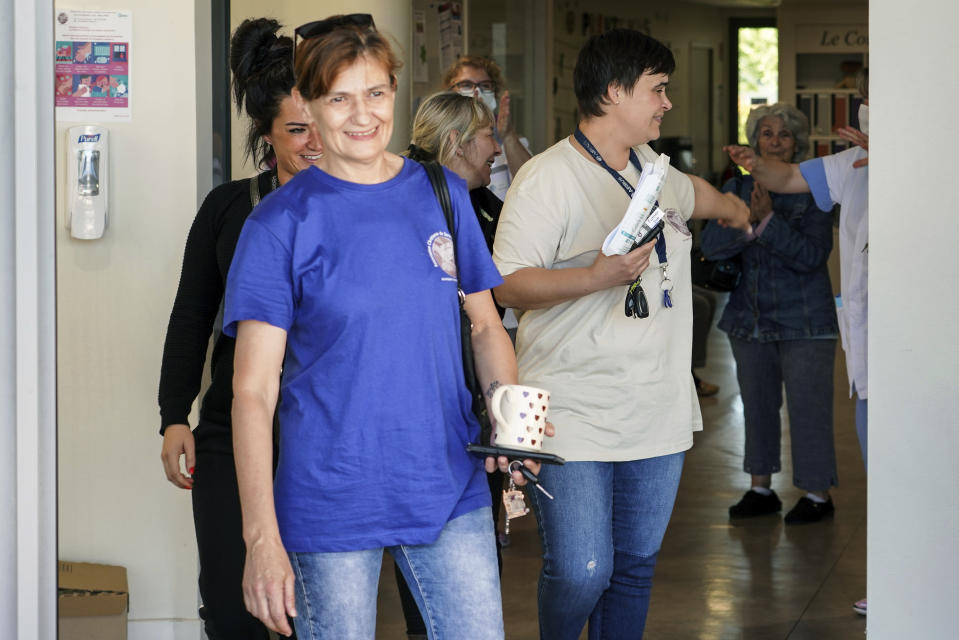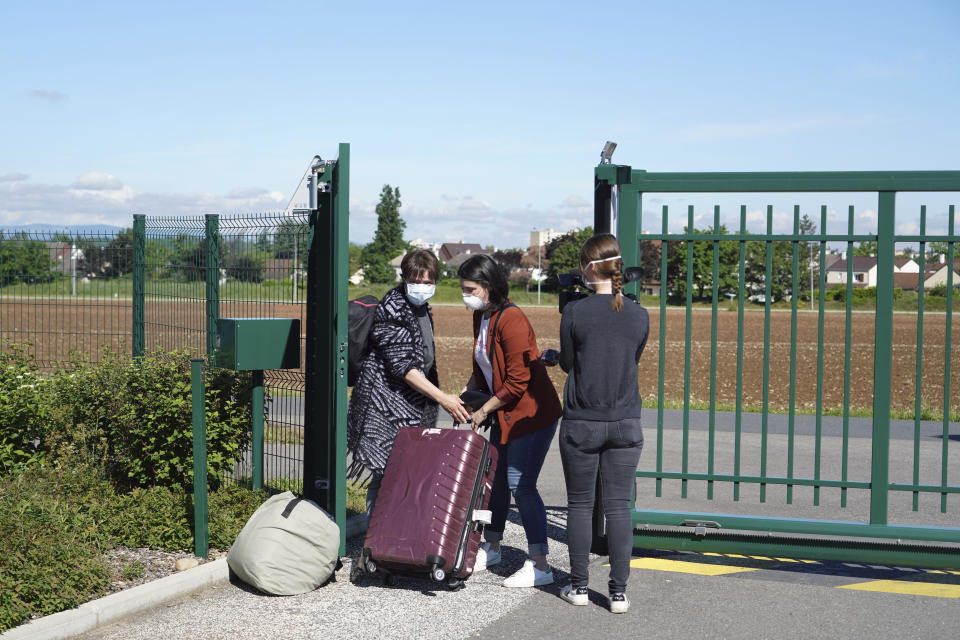French care home where staff locked themselves in with patients for 47 days avoids coronavirus

Staff working in a care home in France who kept their residents safe from coronavirus by locking down with them for 47 days and nights have emerged triumphant.
As the virus cut a deadly path through care homes across France, Valerie Martin, who runs Vilanova care home on the outskirts of the east-central city of Lyon, vowed to keep her staff and 106 residents safe.
Martin and her staff locked themselves in with the residents to keep them safe against the illness, which killed more than a reported 9,000 people in other care homes in France.
On Monday, Martin and 12 other colleagues who stayed in the home for the full duration ended their quarantine after undergoing coronavirus tests that all came back negative – as did tests on residents.
Staff were pictured hugging relatives they hadn’t seen in almost two months as they exited the building, while thankful residents went to the front door to clap the staff for their sacrifice.

Meanwhile in the UK, staff at the White House care home in Teignmouth, Devon, also made the decision to move in with residents to ensure their safety.
In March, 10 members of staff moved into the home, where they care for dementia sufferers, and slept in camper vans and shared staff offices, repurposed as sleeping quarters.
Manager Demelza Lamport told the BBC that since moving in they “have established better relationships with the residents" and that the staff have "settled in really well".
Finance and office manager Rebekah Hayden said: "We made the decision because we thought it was going to be the only way to keep them safe.

"It's had a positive effect on the residents – seeing the same faces all the time.
"It wasn't a difficult decision because I am one of the team, but I talk to my son and parents every day – I miss him and he misses me."
Care homes across Europe have been ravaged by coronavirus, with the elderly and care staff taking the brunt of the pandemic.
Lack of testing is just one in a long list of grievances voiced by care home staff.
While hospitals all over Europe are struggling with a shortage of personal protective equipment (PPE), several nursing homes have reported receiving none at all or struggling with PPE prices.
Latest coronavirus news, updates and advice
Live: Follow all the latest updates from the UK and around the world
Fact-checker: The number of COVID-19 cases in your local area
6 charts and maps that explain how COVID-19 is spreading
On Monday, care home workers in the UK said some employers are playing "Russian roulette" with their lives as PPE is withheld or rationed amid unclear guidance.
Unison said staff are being forced to use bin bags to protect themselves from potentially contracting or spreading COVID-19.
Other staff said they had asked for PPE such as masks and visors, but were told "head office is following government guidelines and will only give them out when they suspect someone might have COVID-19".
Public Health England guidance says staff "should have access to the PPE that protects them for the appropriate setting and context".
A beautiful tribute for mum written by my brother. Please read. https://t.co/n7dob4R7eV
— Rebecca O'Neal (@rebeccaoneal_84) May 1, 2020
On Saturday, the son of a care home nurse who died of coronavirus said lack of PPE killed his mother.
In an online tribute, Ian O’Neal described his mother Suzanne Loverseed, 63, as a “lioness” who gave everything for her children.
He wrote: “At the end, she worked in a care home, with patients dying of this virus. She had no PPE but fearlessly she carried on. That’s what killed her.”
The family were forced to say goodbye to her via an iPad.
On Wednesday, the UK death toll from coronavirus rose sharply after the government included fatalities from outside hospitals in its daily announcement for the first time.
The number of people who have died with coronavirus in UK hospitals, care homes and the wider community rose by 315 on Sunday, the lowest since the end of March.
The deaths brought the total number of fatalities to 28,446.

 Yahoo News
Yahoo News 
